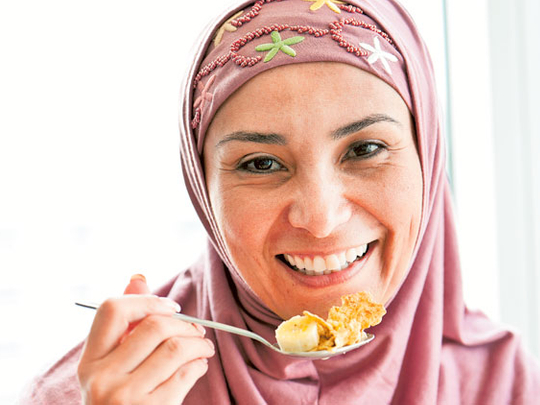
We’ve all worked hard during Ramadan, fasting and avoiding really fattening foods (well, some of us have and some of us haven’t), so with Eid upon us, the temptation is to think, finally, I can stuff my face and let go of all my restrictions! Right?
Wrong.
Beware of overeating this Eid, because not only will you put on weight more quickly, you could also fall sick. Having fasted and deprived your body of three proper meals and two snacks a day, your body is now in starvation mode, while your stomach has shrunk considerably due to the long hours spent without food or beverages. So if you overload it suddenly, you could suffer from one of two scenarios:
1. Gastroesophageal reflux: Under this condition your stomach just can’t handle the sudden deluge of food, and it regurgitates the food or drink.
2 Sudden weight gain: For those who manage to keep the excess food down, you will notice a sudden weight gain during the Eid period. This is because your body is in starvation mode and it will automatically store everything you feed it. This works on a primitive instinct carried forward from a time years when humans didn’t know where the next meal would come from.
Faced with all those goodies, and having deprived yourself for 30 whole days, you may struggle to cope — the temptation is even more pronounced if you have to visit relatives and friends for whom the words “no more cake” just do not exist. Try the following ten great tips for surviving Eid with your waistline intact.
1. Start Eid day with a healthy breakfast. This should ideally include some oat porridge, brown bread with eggs, or healthy cooked hash browns with baked beans. The general idea is to have a breakfast that has a low Glycemic Index, which means it releases energy slowly. Once you are armed with a wholesome breakfast, you are less likely to be tempted by all the goodies being offered to you.
2. It is important to pace yourself as the day progresses. As we all know, most of the visiting happens between breakfast and lunch.
3. Keep a log on your phone, noting down all the goodies you are indulging in. This way you will be able to look at it at regular intervals and realise that you are probably way over your calorie budget already by lunch time.
4. Make sure you have a hearty lunch. However, if you have indulged between breakfast and lunch, it is OK to go easy on this family meal. You can pretend to eat a lot more than you normally would.
5. Ensure you have only one helping of whatever it is you choose. Take a quick look around the feast and decide what it is that you are going to enjoy. Do not fall into the trap of trying everything; this is lethal, as you will pile on the calories dramatically. People often try everything that is laid out and then go back to what they enjoyed the most — ending up taking in anything up to 2000-3000 calories in one meal.
6. Ideally, you should aim to allocate 300 calories for breakfast, 500 calories for lunch and about 400 calories for dinner.
7. Remember to take into account the desserts and snacks that you will be indulging in while visiting people.
8. Try and get more fluids inside you to leave little space for food. Green tea is a great option.
9. Try saying NO a couple of times. If your protests fail and your host looks like they are going to have a coronary, opt for non-fried options if possible.
10. Limit yourself to one small piece of Eid dessert at each stop. And instead of the soft drinks ask for some green tea with no sugar, as you will be getting enough of that with your picks throughout the day.
Ahlaam Ali is a Dubai-based lifestyle and nutrition consultant. You can contact her on powwereat@gmail.com











